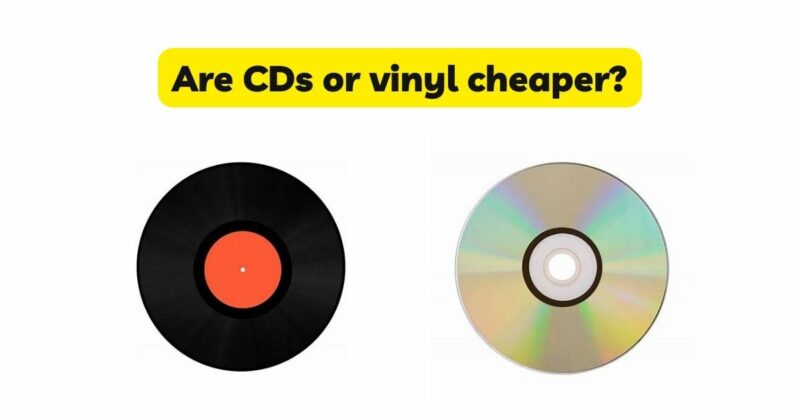The music industry has undergone significant transformations over the years, with advancements in technology leading to the rise of various audio formats. Despite the proliferation of streaming services, physical music formats like CDs and vinyl records continue to hold a special place in the hearts of audiophiles and collectors. In this article, we will explore the economics behind CDs and vinyl records, examining factors such as production costs, pricing, and overall affordability.
- Manufacturing Costs:
When it comes to manufacturing, CDs generally have a significant advantage over vinyl records. Compact discs are relatively inexpensive to produce due to their mass-production techniques and materials. The manufacturing process involves stamping CDs from a master, followed by printing the artwork on the disc and packaging it in a plastic case. On the other hand, vinyl records require a more intricate and time-consuming manufacturing process. The production of vinyl records involves cutting grooves onto master discs, pressing records from vinyl pellets, and then packaging them in sleeves. These additional steps contribute to higher manufacturing costs for vinyl records compared to CDs.
- Retail Pricing:
Retail pricing is a critical factor to consider when determining the affordability of CDs and vinyl records. CDs are generally priced lower than vinyl records, primarily due to the lower manufacturing costs mentioned earlier. Moreover, the widespread popularity of CDs during the late 20th century led to economies of scale, further reducing their retail prices. The affordability of CDs is amplified by the presence of a vibrant used market, where second-hand CDs can be found at significantly discounted prices. In contrast, vinyl records often carry a premium price tag, owing to the costs associated with their manufacturing process and the increasing demand for these nostalgic formats. While there are still affordable vinyl options available, the overall pricing tends to be higher compared to CDs.
- Collectibility and Resale Value:
One aspect where vinyl records have a notable advantage over CDs is their collectibility and potential resale value. Vinyl records are cherished by collectors for their tangible and nostalgic appeal, often leading to a thriving market for rare and sought-after releases. Limited edition pressings, colored vinyl variants, and autographed copies can command high prices among collectors. Additionally, vinyl records tend to retain their value better than CDs, with some records appreciating in price over time. CDs, on the other hand, are generally less sought-after in the collector’s market, and their resale value is often lower compared to vinyl records. While certain rare or out-of-print CDs can still hold value, the overall market for collectible CDs is relatively limited.
- Longevity and Durability:
Durability is an important consideration when assessing the cost-effectiveness of music formats. CDs are known for their resilience to scratches, dust, and environmental conditions, making them more durable than vinyl records. With proper handling and storage, CDs can last for several decades without significant degradation in sound quality. Vinyl records, however, are more susceptible to damage, such as scratches, warping, and surface noise. These issues can impact the playback quality and longevity of vinyl records, necessitating additional investments in cleaning and maintenance equipment. Thus, while CDs may have a higher initial cost, their durability often results in a longer lifespan, potentially offering better value for money in the long run.
Conclusion:
When comparing the economics of CDs and vinyl records, it becomes evident that CDs generally offer a more affordable option for music enthusiasts. Lower manufacturing costs and retail prices, coupled with their durability, contribute to their cost-effectiveness. Vinyl records, on the other hand, often come with a higher price tag due to the more complex manufacturing process and their collectibility factor. While vinyl records hold nostalgic value and can appreciate in price over time, they are generally less accessible in terms of affordability.Ultimately, the choice between CDs and vinyl recordsboils down to personal preferences and priorities. Audiophiles and collectors may prioritize the unique sound and tactile experience of vinyl records, even if it comes at a higher cost. Others may prefer the convenience and affordability of CDs. Both formats have their own merits and appeal, and the decision ultimately depends on individual preferences, budget constraints, and the desired listening experience.In conclusion, while CDs tend to be more affordable due to lower manufacturing costs and retail prices, vinyl records offer a nostalgic and collectible experience that appeals to a specific audience. The economics of CDs vs. vinyl records highlight the trade-offs between cost, durability, and the potential for appreciation in value. Whether one format is cheaper than the other depends on various factors, but it is clear that both have their place in the music industry and continue to captivate listeners in their unique ways.


